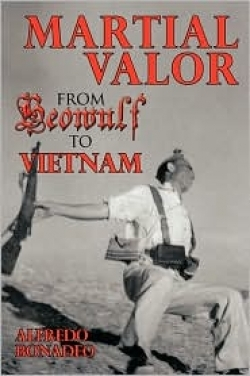Martial Valor
From Beowolf to Vietnam
If a university offered an English course on the changing perception of military valor throughout history as shown through great literature, this book would be its syllabus. Not coincidentally, Alfredo Bonadeo is a professor of languages and literature. His long lifetime of reading, research, teaching, and writing enabled him to write this book, and it shows.
Unfortunately, it shows too much. The opening chapters far too often read like those of an overlong English thesis, or like the transcripts of a semester’s worth of lectures. Bonadeo liberally, and sometimes exhaustingly, illustrates how writers throughout history have examined his subject.
The first fifty-five pages may cause the reader to feel that he is digging his or her way out from under an avalanche of literary citations. Once out of that rubble, however, the light starts to shine much more brightly, and the air becomes far easier to breathe.
From this point on, Bonadeo’s far more selective choices of quotes are quite often stirring, sometimes humorous, and frequently thought-provoking. Most are meant to challenge the reader’s own views on what constitutes military valor, and whether it is something that ever should have been, or should continue to be, admired.
Despite the title, Bonadeo does not start with the Viking skalds who first sang of Beowulf, but delves even further back to Homer and The Iliad for quotes, insights, and comments. Curtius and other Roman writers are also tapped for their views, as are the poets of the age of chivalry, and writers and philosophers through Cervantes and Montaigne and beyond.
The professor continues to mine for such gems in the works of Tolstoy, Crane, Mailer, Hemingway, and Caputo—and many, many other famous novelists. One weakness is that more references are taken from Shakespeare than any other single or pair or trio of writers, and for that Bonadeo goes deep into the folios, pulling up obscure lines from the Bard’s less familiar plays.
Fortunately, once out of the Shakespearean mire, Bonadeo’s prose quickens. His citations broaden beyond the iambic idylls of the Bard of Avon to include the words of men who fought and bled on the battlefield. What men like Carl von Clausewitz and Leo Tolstoy, for example, who fought in the Napoleonic and Crimean Wars, respectively, have to say is just as poetic and powerful as the more stylized soliloquies of Shakespeare.
That Clausewitz and Tolstoy came away from their experiences with completely different notions of valor—both what it means and where it comes from—are brought out very clearly in Bonadeo’s choice of selections. Here, nearly half way through the book, Bonadeo finally forces his students, that is, readers, to think.
This encouragement to think is continued and accelerated as the professor takes us on a journey of combat as seen through the eyes and words of men who fought in the trenches, mountains, and deserts of the First World War. Gabriele D’Annunzio, T.E. Lawrence, Ernest Hemingway, Eric Maria Remarque, and even Benito Mussolini each are allowed to give their honest and very often conflicting views on courage, honor, valor, death, and what they all mean to those at the front.
Bonadeo also gives us a look into the experiences and works of World War Two and Vietnam War veterans, from Norman Mailer to Philip Caputo, and many others in between. Each has very different and very strong opinions not only on what constitutes valor but on how it is honored—or not—by the modern fighting man and his society.
If Bonadeo means to challenge the very notion and value of heroes and heroism, he succeeds. Unfortunately, he may lose much of his audience during the first two chapters (that read like lectures). If the reader stays with Bonadeo for the duration, however, this book will make even the most die-hard military grognard take notice. It will certainly raise the hackles on the back of the neck of many such seasoned campaigners, especially those whose experiences of combat extend no further than the comfort of their arm chair.
Reviewed by
Mark G. McLaughlin
Disclosure: This article is not an endorsement, but a review. The publisher of this book provided free copies of the book and paid a small fee to have their book reviewed by a professional reviewer. Foreword Reviews and Clarion Reviews make no guarantee that the publisher will receive a positive review. Foreword Magazine, Inc. is disclosing this in accordance with the Federal Trade Commission’s 16 CFR, Part 255.

